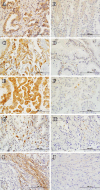Presence of podoplanin-positive cancer-associated fibroblasts in surgically resected primary lung adenocarcinoma predicts a shorter progression-free survival period in patients with recurrences who received platinum-based chemotherapy
- PMID: 25446816
- PMCID: PMC11823911
- DOI: 10.1007/s00432-014-1891-0
Presence of podoplanin-positive cancer-associated fibroblasts in surgically resected primary lung adenocarcinoma predicts a shorter progression-free survival period in patients with recurrences who received platinum-based chemotherapy
Abstract
Purpose: The influence of microenvironmental factors on the effectiveness of chemotherapy is being increasingly recognized. The purpose of this study was to investigate the relationships between cancer cell and stromal cell phenotypes in primary tumors and the progression-free survival (PFS) of recurrent lung cancer patients who received platinum-based chemotherapy.
Methods: We retrospectively analyzed 87 postoperative recurrent lung adenocarcinoma patients treated with platinum-based chemotherapy. The expressions of drug resistance-related proteins including BCRP, ezrin, and ALDH1 in cancer cells, the number of CD204-positive tumor-associated macrophages (TAMs), and the presence of podoplanin-positive cancer-associated fibroblasts (CAFs) in the primary tumor were examined. The relationships between the immunohistochemical staining results of primary tumors and the PFS after receiving chemotherapy were also analyzed.
Results: Among the clinicopathological factors of primary tumors, only an advanced pathological stage was significantly associated with a shorter PFS. As for immunohistochemical staining, no significant relationships were found between the PFS and the expression of BCRP, ezrin, or ALDH1. Although the number of CD204-positive TAMs was not associated with the PFS, the presence of podoplanin-positive CAFs was significantly associated with a shorter PFS (median PFS: 5.1 vs. 7.8 months, P = 0.028). A multivariate analysis revealed a tendency of podoplanin-positive CAFs to be correlated with a shorter PFS (P = 0.087).
Conclusions: The presence of podoplanin-positive CAFs in the primary tumor could be a predictor of a shorter PFS in recurrent lung adenocarcinoma patients who received chemotherapy. These findings suggest that stromal-cell-derived factors should be incorporated into predictions of the effectiveness of chemotherapy.
Conflict of interest statement
The authors have no conflict of interest to disclose.
Figures



Similar articles
-
Podoplanin-positive cancer-associated fibroblast recruitment within cancer stroma is associated with a higher number of single nucleotide variants in cancer cells in lung adenocarcinoma.J Cancer Res Clin Oncol. 2018 May;144(5):893-900. doi: 10.1007/s00432-018-2619-3. Epub 2018 Mar 6. J Cancer Res Clin Oncol. 2018. PMID: 29511884 Free PMC article.
-
The effectiveness and cost-effectiveness of carmustine implants and temozolomide for the treatment of newly diagnosed high-grade glioma: a systematic review and economic evaluation.Health Technol Assess. 2007 Nov;11(45):iii-iv, ix-221. doi: 10.3310/hta11450. Health Technol Assess. 2007. PMID: 17999840
-
Taxane monotherapy regimens for the treatment of recurrent epithelial ovarian cancer.Cochrane Database Syst Rev. 2022 Jul 12;7(7):CD008766. doi: 10.1002/14651858.CD008766.pub3. Cochrane Database Syst Rev. 2022. PMID: 35866378 Free PMC article.
-
Treatment options for progression or recurrence of glioblastoma: a network meta-analysis.Cochrane Database Syst Rev. 2021 May 4;5(1):CD013579. doi: 10.1002/14651858.CD013579.pub2. Cochrane Database Syst Rev. 2021. PMID: 34559423 Free PMC article.
-
Ezrin-expressing lung adenocarcinoma cells and podoplanin-positive fibroblasts form a malignant microenvironment.J Cancer Res Clin Oncol. 2015 Mar;141(3):475-84. doi: 10.1007/s00432-014-1851-8. Epub 2014 Oct 11. J Cancer Res Clin Oncol. 2015. PMID: 25304618 Free PMC article.
Cited by
-
Cancer Associated Fibroblasts in Stage I-IIIA NSCLC: Prognostic Impact and Their Correlations with Tumor Molecular Markers.PLoS One. 2015 Aug 7;10(8):e0134965. doi: 10.1371/journal.pone.0134965. eCollection 2015. PLoS One. 2015. PMID: 26252379 Free PMC article.
-
Cancer-associated fibroblasts in nonsmall cell lung cancer: From molecular mechanisms to clinical implications.Int J Cancer. 2022 Oct 15;151(8):1195-1215. doi: 10.1002/ijc.34127. Epub 2022 Jun 8. Int J Cancer. 2022. PMID: 35603909 Free PMC article. Review.
-
Thy-1+ Cancer-associated Fibroblasts Adversely Impact Lung Cancer Prognosis.Sci Rep. 2017 Jul 25;7(1):6478. doi: 10.1038/s41598-017-06922-5. Sci Rep. 2017. PMID: 28744021 Free PMC article.
-
Cancer chemotherapy: insights into cellular and tumor microenvironmental mechanisms of action.Front Oncol. 2022 Jul 29;12:960317. doi: 10.3389/fonc.2022.960317. eCollection 2022. Front Oncol. 2022. PMID: 35965519 Free PMC article. Review.
-
Cancer-associated fibroblast cell surface markers as potential biomarkers or therapeutic targets in lung cancer.Cancer Drug Resist. 2024 Sep 10;7:32. doi: 10.20517/cdr.2024.55. eCollection 2024. Cancer Drug Resist. 2024. PMID: 39403603 Free PMC article. Review.
References
-
- Chang A (2011) Chemotherapy, chemoresistance and the changing treatment landscape for NSCLC. Lung Cancer 71(1):3–10 - PubMed
-
- Chung FT, Lee KY, Wang CW et al (2012) Tumor-associated macrophages correlate with response to epidermal growth factor receptor-tyrosine kinase inhibitors in advanced non-small cell lung cancer. Int J Cancer 131(3):e227–e235 - PubMed
-
- Farmer P, Bonnefoi H, Anderle P et al (2009) A stroma-related gene signature predicts resistance to neoadjuvant chemotherapy in breast cancer. Nat Med 15(1):68–74 - PubMed
Publication types
MeSH terms
Substances
LinkOut - more resources
Full Text Sources
Other Literature Sources
Medical
Research Materials
Miscellaneous

